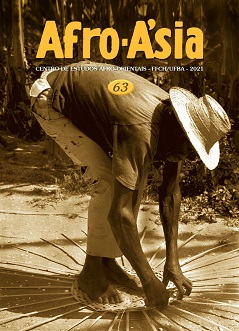A importância do café para São Tomé e Príncipe frente à proibição do comércio de escravizados pela Inglaterra
DOI:
https://doi.org/10.9771/aa.v0i63.38370Palavras-chave:
Café, São Tomé e Princípe, Tráfico escravizadosResumo
Este artigo aborda a cultura cafeeira em São Tomé e Príncipe durante o período imediatamente posterior à proibição inglesa do comércio de escravizados em 1807. Considerada a cultura capaz de desenvolver a agricultura no arquipélago, o café, apesar da resistência inicial ao seu cultivo, manteve o interesse e a presença de embarcações estrangeiras quando da interdição inglesa e da isenção de ancoragem concedida pela Coroa portuguesa a todos os navios do Brasil que comercializavam na Costa da Mina; desde que fossem recolhidos os direitos aos portos onde ocorreram as barganhas comerciais. Beneficiando-se da demanda existente e da qualidade, o grão aos poucos conquistou o interesse e foi apontado como a cultura que ajudaria a superar o cenário de proibição do comércio de sua maior receita alfandegária até então, o comércio de escravizados.
Downloads
Downloads
Publicado
Como Citar
Edição
Seção
Licença
Copyright (c) 2021 Alan de Carvalho Souza

Este trabalho está licenciado sob uma licença Creative Commons Attribution 4.0 International License.
Você pode compartilhar, adaptar e utilizar livremente este trabalho para qualquer finalidade legítima, desde que mencione explicitamente a autoria e a publicação inicial nesta revista.




